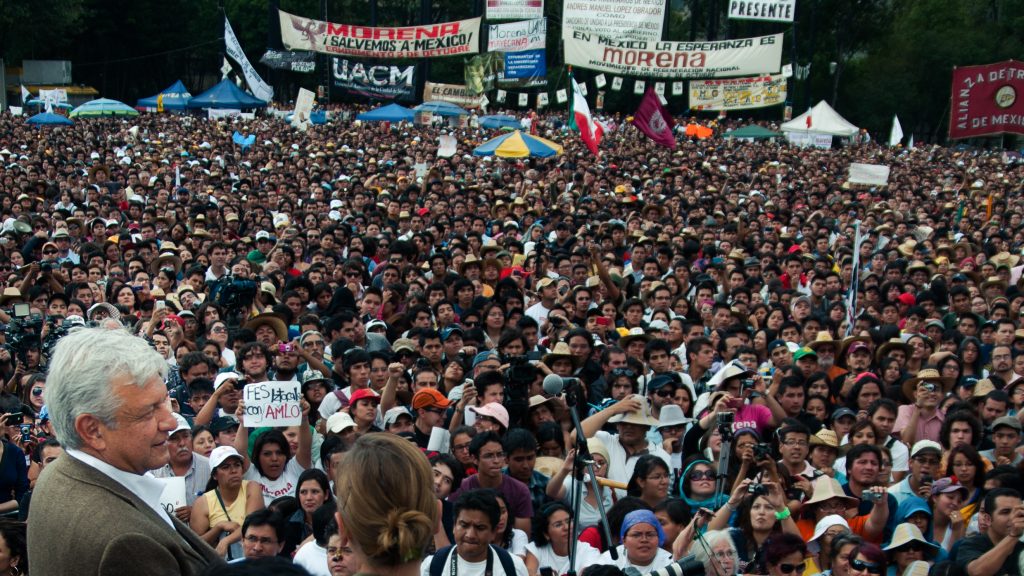Populists on Both Sides of the Wall?
Ahead of the Mexican election in July, a leftwing populist is the clear frontrunner amid exasperation with political corruption and snail-paced social reform.
The Mexican presidential race was probably over the minute it began. Recent polls consistently put leftist populist Andrés Manuel López Obrador ahead, with a lead of at least 10 points versus the centre-right National Action Party’s Ricardo Anaya. Ahead of the national vote on July 1, many Mexicans hope radical change will punish a corrupt political elite but others fear the populist wave will spark more problems than it can solve.
Andrés Manuel López Obrador, often known as AMLO, a former mayor of Mexico City has already run for president twice in 2006 and 2012. In both cases his campaign started strongly, but he lost ground as his remarks became more radical and he revealed an inability to take criticism. In both cases, he questioned the legitimacy of the elections immediately after his loss. This time round, he is back at the podium, raging against entrenched political graft while heralding the arrival of the country’s “fourth national transformation”.
A highly corrupt Mexican government has been unable to deny his accusations, suggesting Mexico’s need for major change. However, López Obrador lacks the policies to underpin his campaign slogans. He has voiced his ambition to reverse structural reforms that were recently implemented to boost Mexican economy. His rhetoric has echoes of that of populist leaders in Europe and the United States, milking social inequality, driving polarization, promoting nationalism, and making policy proposals based on unverified economic arguments.
Soaring Voter Skepticism
In a context of rising poverty, insecurity and international tensions, populist ideas fall on fertile ground in today’s Mexico. Trust in political parties, government institutions and democracy itself has nosedived and people are demanding the political action that past administrations failed to deliver. This appetite for change is highlighted by the 2018 Bertelsmann Transformation Index (BTI) which put Mexico at position 48 of 129 countries, scoring 6.23 out of a maximum 10 points, pointing to the country’s failure to steer towards democracy and a market economy.
The BTI indicator dubs Mexico as a “defective democracy”, a fact which partly explains the populist surge that will likely define the presidential vote. In terms of political and social integration, the index graded Mexico’s status, or where the country is on the road to democracy, with 5.5 out of a possible 10 points, reflecting waning commitment to democracy as governments have failed to fight widespread insecurity, corruption or practices of impunity. According to the report, this figure could be set to sink further: “Inefficacies in both the executive and legislative powers have affected the public’s views of the political parties, a trend that risks reducing the prevailing opinion of democracy,” it stated. At the same time, the political establishment has not improved wealth distribution or economic development, another motor behind popular disaffection.
Protest Voting Takes Center Stage
In a society where hope is in short supply, the presidential race is viewed by many as a chance to express discontent. During the first presidential debate on April 22, there were few constructive proposals, as the candidates focused on attacking each other’s flaws. Attention focused on López Obrador, who was accused of repeated inconsistencies and who provided no concrete response to serious evidence indicating corruption in his cabinet. The evidence did not seem to harm the politician’s image, whose strength is mainly based on pointing out the governments’ weaknesses thus encouraging voters to express their discomfort.
A large chunk of the electorate fails to acknowledge that the candidate’s plan for the nation is unrealistic and ambiguous. Moreover, some proposals defy logic. For example, he has suggested significant investment in building oil refineries while temporarily freezing private investment in oil exploration and production. Considering Mexico’s reliance on oil exports, analysts have forecasted losses from delaying exploration. Meanwhile, it may be unfeasible to pump enough resources into new refineries that are able to compete with those on the U.S. Gulf Coast.
The candidate’s proposals have reached a significantly absurd peak, for example his announcement formalizing recalling corroborating his plans to sell the presidential airplane to Donald Trump, a remark which boils down to a populist move, suggesting a decrease in political expenditure as well as a punishment for high maintenance politicians.
The Mexican presidential elections for 2018 will be historic, not least because two independent candidates reached the final round for the first time. Nor has the population ever been polarized to this extent.
A Mexican Ballot With International Clout
Whatever the outcome is for the Mexican presidential elections, the results will resonate internationally amid the proliferation of nationalistic leaders adopting inward-looking agendas. Under these circumstances, López Obrador’s call for nationalistic policies and a closed economic model will surely drive away foreign investment and hurt multilateral collaboration with other countries.
Meanwhile, relations with the USA are already fragile, following incriminatory remarks and the militarization of the border. Clashes over migration and security as well as a volatile renegotiation of the North American Free Trade Agreement. Adding another radical populist leader to the mix will surely deepen this schism. And Mexico seems poised to make the same mistake that the USA made a year earlier, which will create shockwaves well beyond its own borders.

